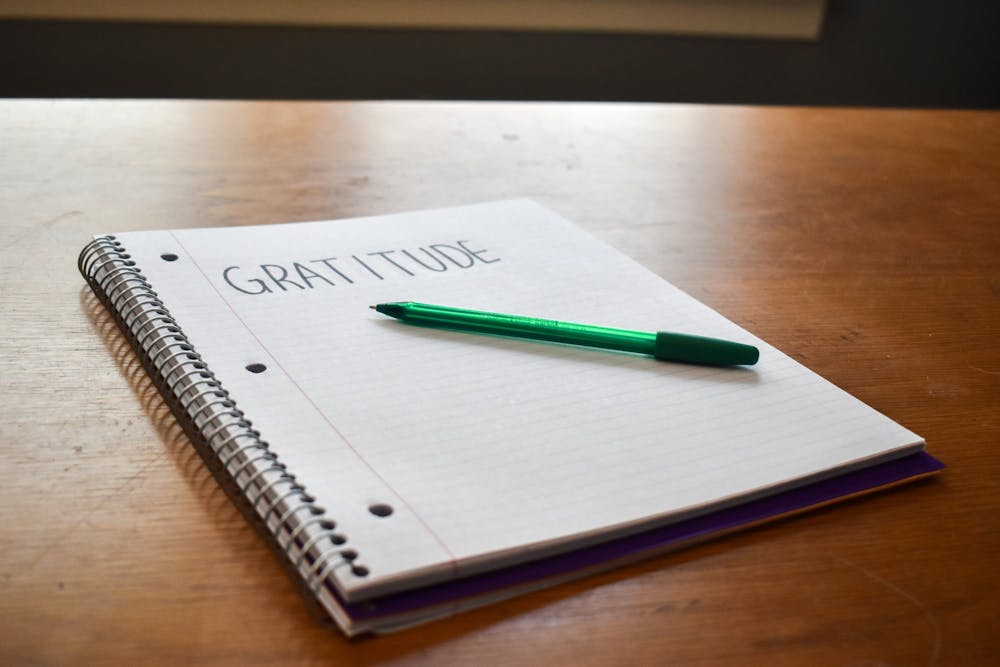As many of us uneasily navigate a return to on-campus life, practicing gratitude is a beneficial habit we can cultivate. While we cannot control what happens with the COVID-19 pandemic, we can control how we respond to it. I would like to share my story of cultivating gratitude, present supportive research findings and share ways you can practice gratitude as well.
I have a colorful stack of Moleskine notebooks stacked in my closet, many of which are gratitude journals that I have kept since January 2018. I started journaling because of my inspirational AP Psychology teacher, Dr. Graham. She suggested that I start a gratitude journal after noticing that I would leave class looking deflated, with my head down.
I began to journal each night before I went to sleep, opening up a black notebook that sat on my bedside drawer. I would write three things I was grateful for from that day while sitting in bed, and over time, I started to scribble the word “because” and describe why I was thankful for each of those things, people or experiences.
Even now, I still journal about gratitude almost every evening before bed. Although gratitude is not a miracle cure to prevent unhappiness, gratitude is a muscle that I have learned to strengthen. Like any muscle, one can only see results with sustained effort over time.
There are a few different ways one can practice gratitude. One can list out what they are grateful for, write a gratitude letter to themself or to someone else, or contemplate what they are grateful for.
Here’s the science to back up practicing gratitude. In a 2015 study, researchers found that the experience of giving and receiving gratitude was negatively correlated with loneliness. In a 2011 study, participants who engaged in gratitude contemplation reported higher life satisfaction and self-esteem.
Writing gratitude letters may also be linked to increased happiness and reduced feelings of depression. I have written two gratitude letters to this point: one for Dr. Graham for inspiring my love of psychology and one for a Penn upperclassman who made me feel at home during my first semester. After sending these letters to them, I felt good about myself. I felt like I was spreading good in the world. Best of all, it was heartwarming to read their responses.
After writing the letters, I did not notice a significant change in my happiness over the months, but I don’t think that’s really the point. In my opinion, the objective is to use gratitude as a tool to make other people feel appreciated, which in turn, can make us feel good about ourselves.
SEE MORE FROM JADEN CLOOBECK:
Unfortunately, our brains are hardwired to see the negative before seeing the positive, also known as negativity bias. To combat negativity bias, we can practice gratitude in our everyday lives, whether it be appreciating reclaimed experiences, such as seeing a friend in person whom you have not seen in months, or thanking a professor or TA as you leave class.
Furthermore, practicing gratitude is related to another phenomenon that may be helpful in re-building our campus culture: positive gossip.
Positive gossip is the practice of complimenting others while they are not around. In my experience, sharing your gratitude for a friend to another person may make you feel more appreciative of that friend. For example, I would like to shout out Dr. Graham for her kindness and compassion in encouraging me to document what I am grateful for during a difficult time in my life. I won’t forget that.
As we embark on this unusual return to on-campus life, let's make gratitude a daily ritual that we intentionally practice, like brushing our teeth or going to sleep. Start small. Be easy on yourself if you see that a certain gratitude strategy is not working for you. You can experiment and see what works best for you.
After an emotionally exhausting 18 months braving a pandemic, a divisive presidential election and protests for racial justice, having an attitude of gratitude can be a way we can reclaim happiness, one day at a time.
JADEN CLOOBECK is a College senior from Laguna Beach, Calif. studying psychology. His email address is jaden@sas.upenn.edu.









